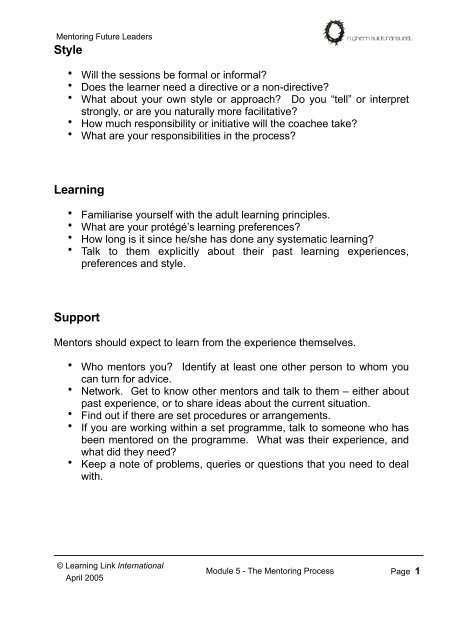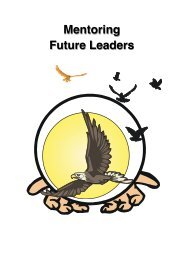- Page 1 and 2:
Mentoring
Future Leaders
- Page 3 and 4:
Mentoring Future Leaders Preface ©
- Page 5 and 6:
Mentoring Future Leaders Preface Au
- Page 7 and 8:
Mentoring Future Leaders Preface !
- Page 9 and 10:
Module 1
- Page 11 and 12:
Mentoring Future Leaders
© Lea
- Page 13 and 14:
Mentoring Future Leaders ! ! ! ! !
- Page 15 and 16:
Mentoring Future Leaders © Learnin
- Page 17 and 18:
Mentoring Future Leaders © Learnin
- Page 19 and 20:
Mentoring Future Leaders © Learnin
- Page 21 and 22:
Mentoring Future Leaders © Learnin
- Page 23 and 24:
Mentoring Future Leaders Are Mentor
- Page 25 and 26:
Mentoring Future Leaders People Dev
- Page 27 and 28:
Mentoring Future Leaders © Learnin
- Page 29 and 30:
Mentoring Future Leaders “We lead
- Page 31 and 32:
Mentoring Future Leaders What are t
- Page 33 and 34:
Mentoring Future Leaders • Person
- Page 35 and 36:
Mentoring Future Leaders © Learnin
- Page 37 and 38:
Mentoring Future Leaders Mentoring,
- Page 39 and 40:
Mentoring Future Leaders © Learnin
- Page 41 and 42:
Mentoring Future Leaders Chip Bell
- Page 43 and 44:
Mentoring Future Leaders “When he
- Page 45 and 46:
Mentoring Future Leaders Discussion
- Page 47 and 48:
Mentoring Future Leaders © Learnin
- Page 49 and 50:
Mentoring Future Leaders © Learnin
- Page 51 and 52:
Mentoring Future Leaders © Learnin
- Page 53 and 54:
Mentoring Future Leaders 1. Project
- Page 55 and 56:
Mentoring Future Leaders © Learnin
- Page 57 and 58:
Mentoring Future Leaders Module 2:
- Page 59 and 60:
Mentoring Future Leaders Module 2:
- Page 61 and 62:
Mentoring Future Leaders 2. What qu
- Page 63 and 64:
Mentoring Future Leaders © Learnin
- Page 65 and 66:
Mentoring Future Leaders What Do Yo
- Page 67 and 68:
Mentoring Future Leaders 1. Fear of
- Page 69 and 70:
Mentoring Future Leaders What Mente
- Page 71 and 72:
Mentoring Future Leaders © Learnin
- Page 73 and 74:
Mentoring Future Leaders To Become
- Page 75 and 76:
Mentoring Future Leaders Personal a
- Page 77 and 78:
Mentoring Future Leaders Co-operati
- Page 79 and 80:
Mentoring Future Leaders A trusting
- Page 81 and 82:
Mentoring Future Leaders it is. As
- Page 83 and 84:
Mentoring Future Leaders Mentoring
- Page 85 and 86:
Mentoring Future Leaders © Learnin
- Page 87 and 88:
Mentoring Future Leaders 4. What ca
- Page 89 and 90:
Mentoring Future Leaders Appendix B
- Page 91 and 92:
Mentoring Future Leaders Appendix C
- Page 93 and 94:
Mentoring Future Leaders 4 SCORING
- Page 95 and 96:
Mentoring Future Leaders 4 Interpre
- Page 97 and 98:
Mentoring Future Leaders © Learnin
- Page 99 and 100:
Mentoring Future Leaders Creating a
- Page 101 and 102:
Mentoring Future Leaders Creating a
- Page 103 and 104:
Mentoring Future Leaders Time: Loca
- Page 105 and 106:
Mentoring Future Leaders 4. Please
- Page 107 and 108:
Mentoring Future Leaders 6. What im
- Page 109 and 110:
Module 3 Building Trusting Rela
- Page 111 and 112:
Mentoring Future Leaders Module 3:
- Page 113 and 114:
Mentoring Future Leaders © Learnin
- Page 115 and 116:
Mentoring Future Leaders 2. © Lear
- Page 117 and 118:
Mentoring Future Leaders • What c
- Page 119 and 120:
Mentoring Future Leaders 4. Can you
- Page 121 and 122:
Mentoring Future Leaders © Learnin
- Page 123 and 124:
Mentoring Future Leaders © Learnin
- Page 125 and 126:
Mentoring Future Leaders 1. How imp
- Page 127 and 128:
Mentoring Future Leaders • “I h
- Page 129 and 130:
Mentoring Future Leaders March 2005
- Page 131 and 132:
Mentoring Future Leaders mode by sa
- Page 133 and 134:
Module 4
Mentoring Skills
- Page 135 and 136:
Mentoring Future Leaders © Learnin
- Page 137 and 138:
Mentoring Future Leaders Mentoring
- Page 139 and 140:
Mentoring Future Leaders Tasks whic
- Page 141 and 142:
Mentoring Future Leaders © Learnin
- Page 143 and 144:
Mentoring Future Leaders Elements o
- Page 145 and 146:
Mentoring Future Leaders Making Sug
- Page 147 and 148:
Mentoring Future Leaders Telling Th
- Page 149 and 150: Mentoring Future Leaders Applicatio
- Page 151 and 152: Mentoring Future Leaders • The pr
- Page 153 and 154: Mentoring Future Leaders © Learnin
- Page 155 and 156: Mentoring Future Leaders Active Lis
- Page 157 and 158: Mentoring Future Leaders © Learnin
- Page 159 and 160: Mentoring Future Leaders Guidelines
- Page 161 and 162: Mentoring Future Leaders © Learnin
- Page 163 and 164: Mentoring Future Leaders It is Time
- Page 165 and 166: Mentoring Future Leaders © Learnin
- Page 167 and 168: Mentoring Future Leaders Change is
- Page 169 and 170: Mentoring Future Leaders How to Pre
- Page 171 and 172: Mentoring Future Leaders Technique
- Page 173 and 174: Mentoring Future Leaders Technique
- Page 175 and 176: Mentoring Future Leaders couldn’t
- Page 177 and 178: Mentoring Future Leaders De Bono’
- Page 179 and 180:
Mentoring Future Leaders © Lea
- Page 181 and 182: Mentoring Future Leaders © Learnin
- Page 183 and 184: Mentoring Future Leaders Key Mentor
- Page 185 and 186: Mentoring Future Leaders © Learnin
- Page 187 and 188: Mentoring Future Leaders Step 5: St
- Page 189 and 190: Mentoring Future Leaders © Learnin
- Page 191 and 192: Mentoring Future Leaders April 2005
- Page 193 and 194: Mentoring Future Leaders • Use yo
- Page 195 and 196: Mentoring Future Leaders A Few Remi
- Page 197 and 198: Mentoring Future Leaders Appendix A
- Page 199: Mentoring Future Leaders Option 2:
- Page 203 and 204: Mentoring Future Leaders 3. What wi
- Page 205 and 206: Mentoring Future Leaders © Learnin
- Page 207 and 208: Mentoring Future Leaders Appendix B
- Page 209 and 210: Mentoring Future Leaders © Learnin
- Page 211 and 212: Mentoring Future Leaders Option 4:
- Page 213 and 214: Mentoring Future Leaders A. Individ
- Page 215 and 216: Mentoring Future Leaders 2(a) Your
- Page 217 and 218: Mentoring Future Leaders © Learnin
- Page 219 and 220: Mentoring Future Leaders The mentor
- Page 221 and 222: Mentoring Future Leaders Designing
- Page 223 and 224: Mentoring Future Leaders (Inner & E
- Page 225 and 226: Mentoring Future Leaders Appendix E
- Page 227 and 228: Module 6 Case Studies & Role Plays
- Page 229 and 230: Mentoring Future Leaders Module 6:
- Page 231: Mentoring Future Leaders Aktiwiteit




